Key takeaways:
- Follow-ups after workshops are essential for reinforcing learning, nurturing enthusiasm, and facilitating ongoing communication and collaboration.
- Personalized follow-up messages enhance participant engagement and make individuals feel valued, fostering deeper connections.
- Utilizing digital tools for organizing follow-up tasks improves accountability and encourages continuous interaction among participants.
- Measuring follow-up effectiveness through surveys and engagement metrics helps refine future communications and strategies.
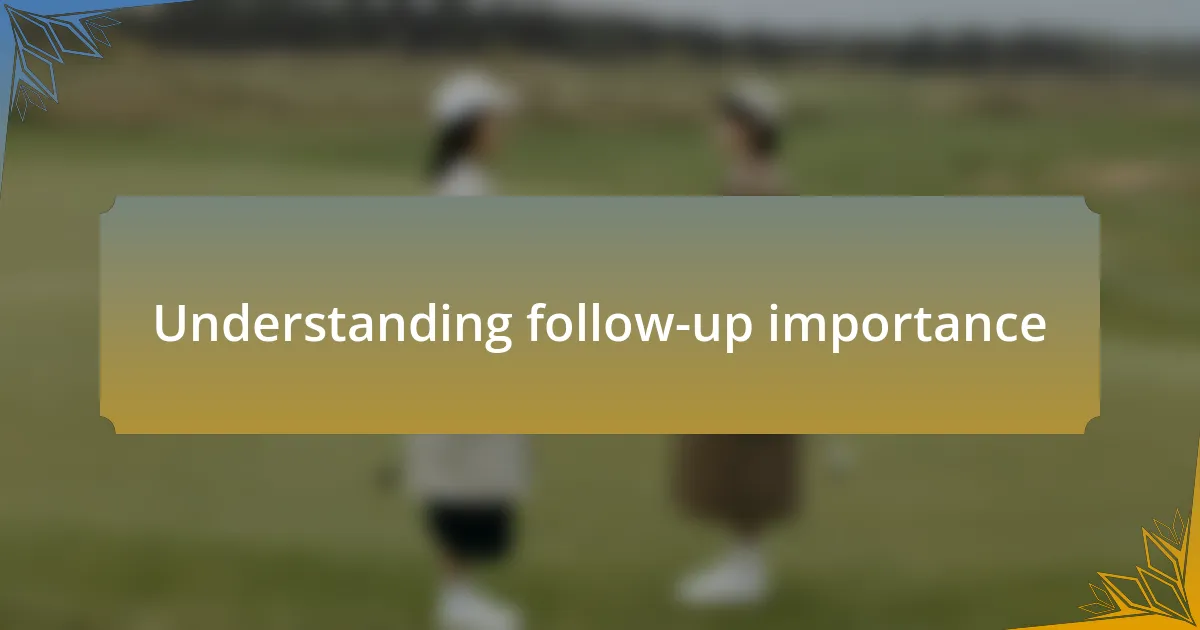
Understanding follow-up importance
Follow-up after workshops isn’t just a courtesy; it’s a crucial step in solidifying what was learned. I remember one workshop where the facilitators sent a thoughtful follow-up email with additional resources. That simple act made a significant impact, helping the information stay fresh in my mind and providing a bridge to further discussions.
Have you ever walked away from a session feeling inspired, only to let that excitement fade? I know I have. Effective follow-ups ensure that enthusiasm is nurtured, transforming fleeting moments of insight into lasting change. It’s like planting a seed and making sure it’s watered regularly to grow.
Additionally, follow-ups create an opportunity for ongoing communication, fostering relationships that can lead to collaboration and innovation. Reflecting on my own experiences, these connections have often opened doors to new projects and partnerships. It’s not just about what was presented; it’s about creating a lasting dialogue that keeps the conversation alive long after the workshop has ended.
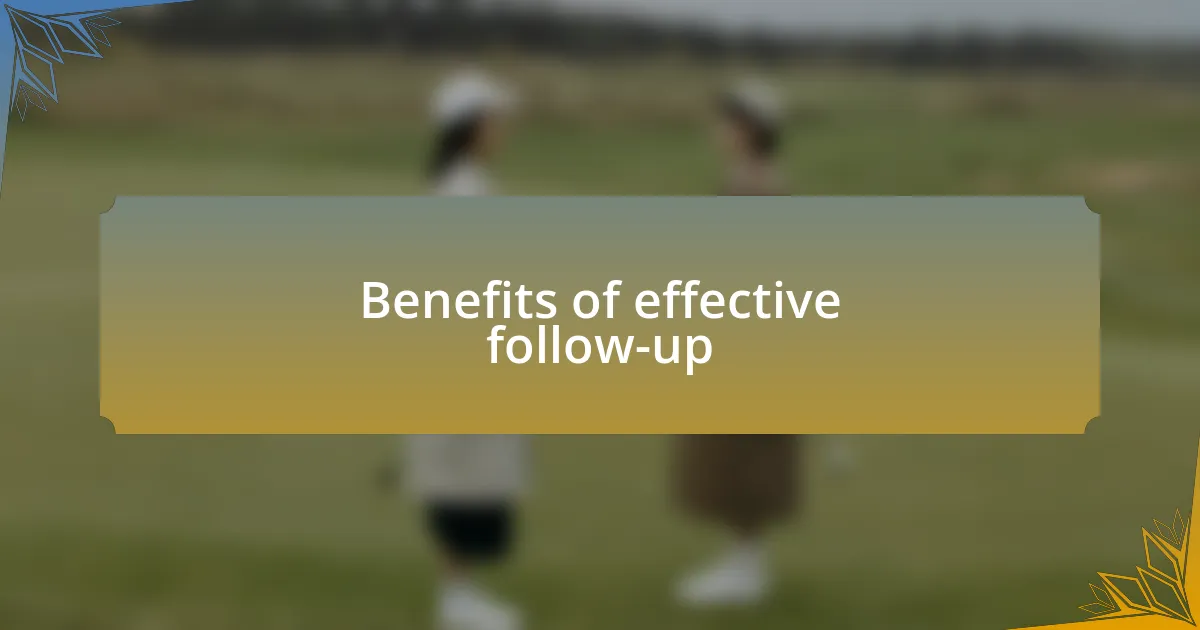
Benefits of effective follow-up
Effective follow-up transforms a one-time experience into a journey of growth. I vividly recall a time when I attended a workshop, and the organizers reached out afterward with a personalized summary of the key points. That follow-up not only clarified my understanding but made me feel valued as a participant, enhancing my overall experience and motivating me to delve deeper into the subject.
Moreover, consistent communication after workshops lays the groundwork for a community of practice. I’ve seen how sharing ideas and resources can elevate everyone involved. For instance, after a workshop on customer experience, a simple follow-up led to a group chat among attendees. This platform allowed us to bounce ideas off each other and nurtured a supportive network where we continually learn from one another.
Ultimately, effective follow-up strengthens retention and encourages action. When I receive materials that tie back to what I learned, it sparks my curiosity. I often find myself revisiting those lessons and applying them actively in my work. Isn’t it amazing how a few thoughtful follow-up actions can elevate knowledge from a workshop into meaningful practice?
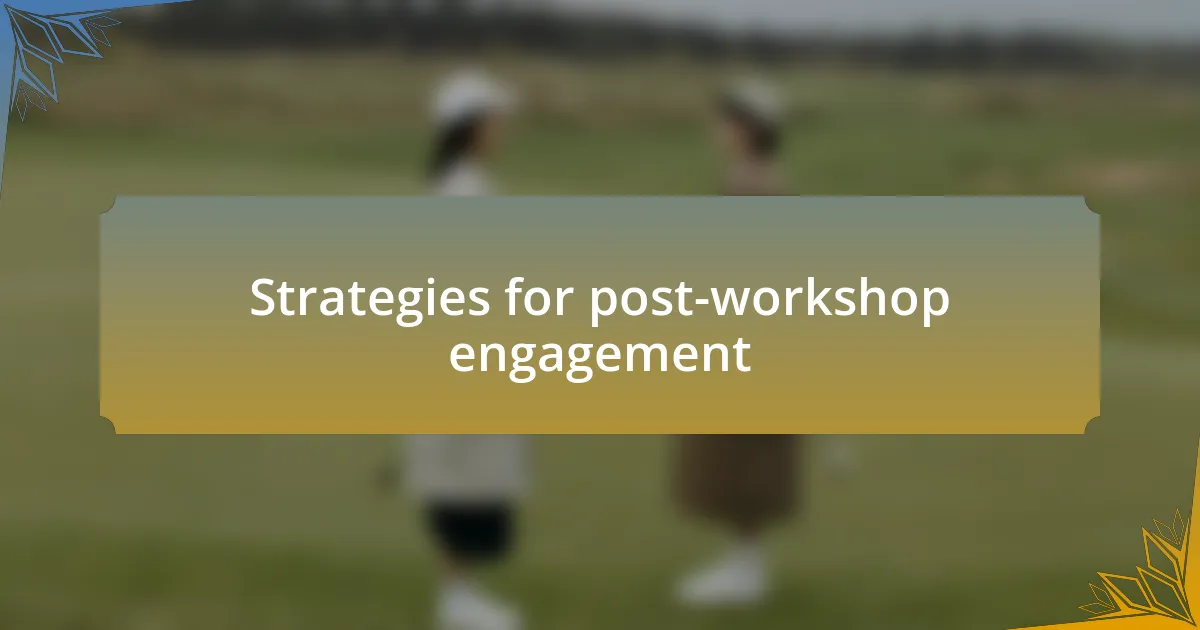
Strategies for post-workshop engagement
To effectively engage participants after workshops, I believe personalized follow-ups are invaluable. Recently, after a workshop I attended, the facilitator sent me tailored resources based on my specific interests discussed during the session. This thoughtful gesture not only made me feel recognized but inspired me to take actionable steps toward implementing what I learned. Have you ever received a message that reignited your passion for a topic? It can make all the difference.
Another strategy I find particularly effective is organizing post-workshop feedback sessions. I once participated in a follow-up meeting where we dissected various takeaways and shared how we applied them in our work. The open dialogue was enlightening; it felt less like an evaluation and more like a collaborative brainstorming session. Engaging in this manner nurtures a sense of belonging and encourages enduring connections among participants, don’t you think?
Lastly, creating engaging digital content can keep the momentum going long after the workshop ends. I’ve seen success with newsletters that include highlights from the event, alongside fresh insights or relevant articles. This ongoing engagement not only reinforces what we learned but also fosters anticipation for future events. Isn’t it exciting to think how these simple strategies can transform a workshop experience into a vibrant learning community?
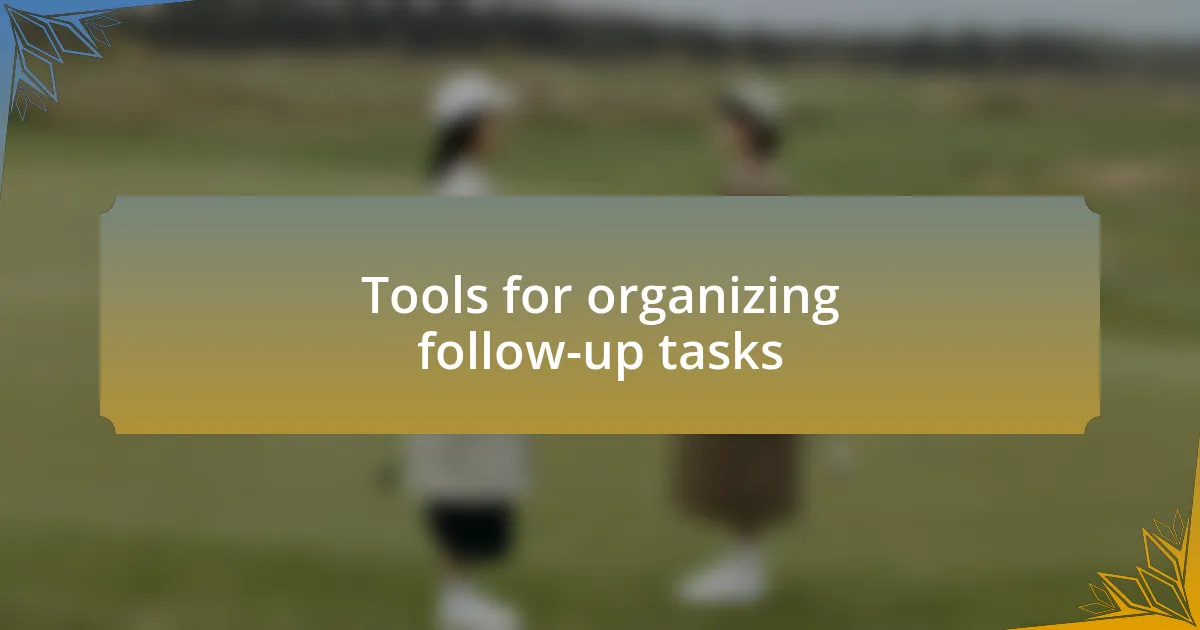
Tools for organizing follow-up tasks
When it comes to organizing follow-up tasks after a workshop, leveraging digital tools can be a game changer. I recently discovered project management software like Trello and Asana, which allow me to create task lists, set deadlines, and even assign responsibilities to team members. These platforms not only streamline the process but also keep everyone accountable. Have you ever experienced the satisfaction of crossing a task off your list? It feels invigorating!
I find that utilizing communication tools, such as Slack or Microsoft Teams, facilitates real-time discussions around follow-up actions. I remember a workshop where we created a dedicated channel to share resources and updates. The continuous exchange of ideas and feedback kept everyone engaged and motivated to pursue our goals. How empowering is it to have a virtual space where collaboration thrives, even post-event?
Additionally, I often use email automation software to schedule follow-up messages and reminders. After a recent conference, I set up an automated sequence to send out thank-you notes and share additional resources. The response was overwhelmingly positive; participants appreciated the timely nudges. It’s incredible how such tools can enhance connections and keep the enthusiasm alive long after the official event concludes. Have you tried using automation for your follow-ups? The impact can be remarkable!
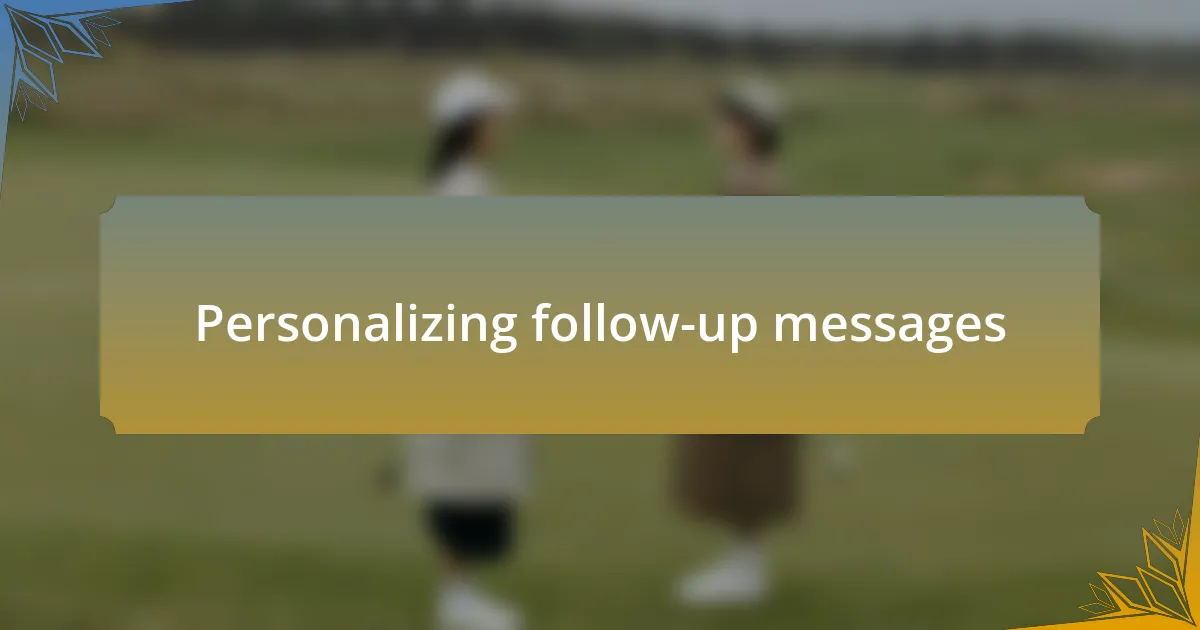
Personalizing follow-up messages
Personalizing follow-up messages is key to making participants feel valued. I recall a time when I took the extra step of mentioning a specific conversation I had with a participant during a workshop. Their reaction was one of surprise and appreciation, as it showed that I genuinely listened. Have you ever noticed how a simple reference can turn a generic message into something meaningful?
To add a personal touch, I also like to segment my follow-ups based on interests expressed during the workshop. For instance, after a session on customer service strategies, I tailored follow-up content to emphasize techniques relevant to each person’s field. This approach not only increased engagement but also fostered a sense of community, creating bonds that extended beyond the event. Isn’t it rewarding to know that your follow-ups resonate on a deeper level?
Moreover, incorporating specific details—like mentioning their business goals or challenges—can significantly enhance your message’s impact. I remember crafting a follow-up email that referenced a participant’s question about social media strategies. The response was overwhelmingly positive, and it sparked further conversations. Have you ever felt more connected to someone because they remembered something unique about you? Personalization can make all the difference in nurturing those connections.
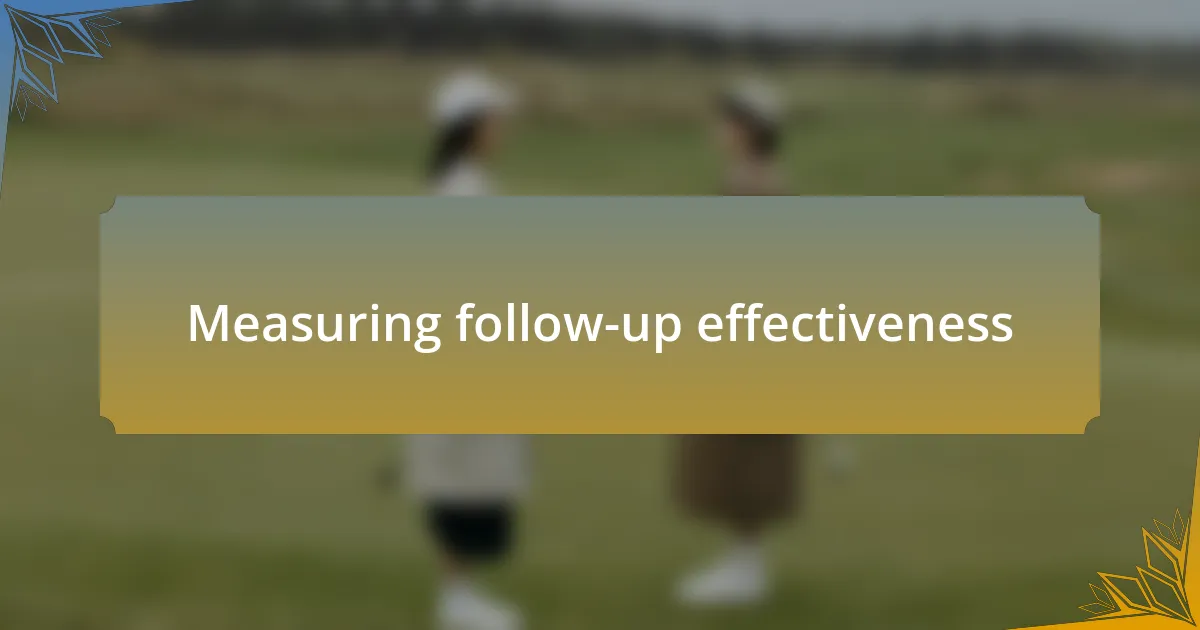
Measuring follow-up effectiveness
Measuring the effectiveness of follow-ups is crucial to understanding their impact on participants. I once conducted a survey after a workshop, asking attendees how useful they found the follow-up materials. The results surprised me—over 70% found them valuable, and that information really guided my future communications. Have you ever considered how feedback can shape your follow-up strategy?
Another method I’ve employed is tracking engagement metrics, such as open and click-through rates of my follow-up emails. Analyzing these numbers revealed that certain subject lines resonated more with my audience. For example, when I used a question motif, the click-through rate skyrocketed. It made me wonder—how much do our words truly influence engagement?
Lastly, qualitative feedback can offer a wealth of insight. I remember a time when a participant reached out after my follow-up, expressing how the information helped them implement new strategies at work. Such anecdotes are invaluable; they not only highlight the effectiveness of my approach but also reinforce the importance of understanding individual experiences. Have you gathered stories like these to measure your follow-up success?
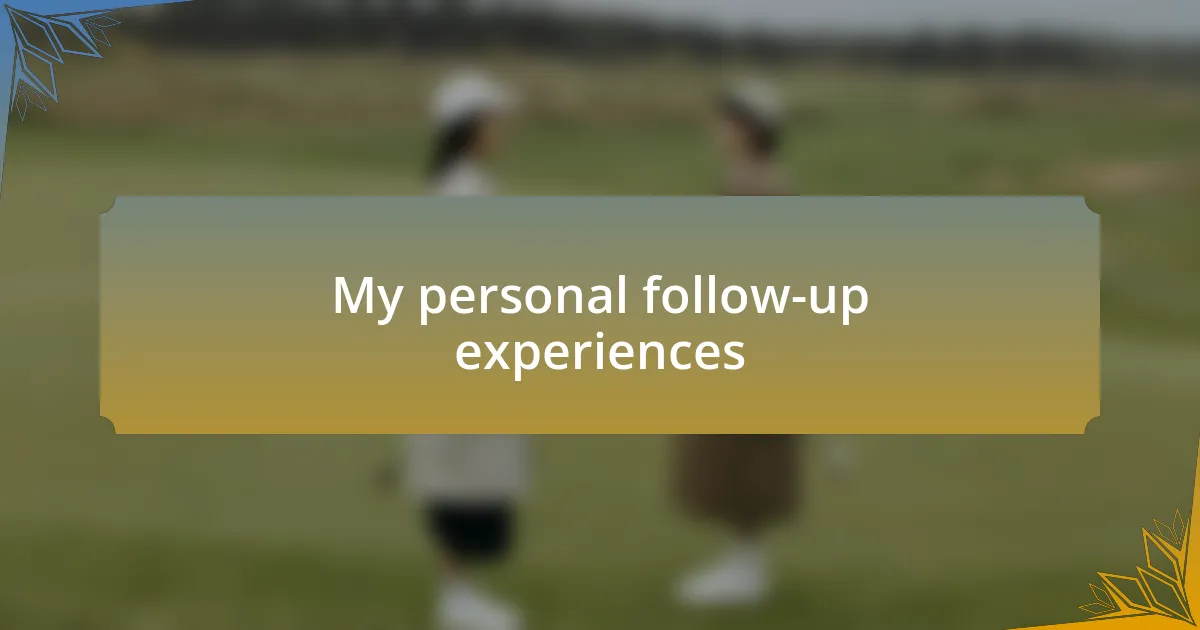
My personal follow-up experiences
Reflecting on my personal follow-up experiences, I remember a particular instance when I reached out to participants after a workshop about customer engagement. One attendee replied with heartfelt enthusiasm, sharing how a specific tactic I introduced during the session transformed their team’s dynamics. It was touching to realize that my insights had sparked such real-world change. Have you ever felt that rush of validation when someone shares how your work made a difference?
I also recall a time when I decided to host a casual online Q&A session following a workshop. The connection was incredibly rewarding. The attendees opened up about their challenges in applying what they learned, and it felt like a safe space for sharing ideas and solutions. I found it fascinating how these conversations deepened my understanding of their needs. Have you contemplated creating similar opportunities for ongoing dialogue with your participants?
On another occasion, I made it a point to send personalized follow-up messages, addressing individual queries and concerns raised during the workshop. One recipient responded with genuine appreciation, mentioning that it made them feel valued. That experience opened my eyes to how small, intentional gestures can enhance the relationship and foster trust. How do you approach personalization in your own follow-ups?